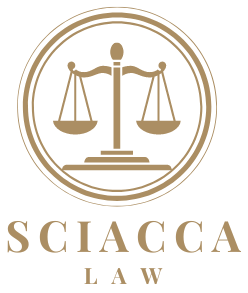FAQs
Sciacca Law
Have a legal question? Sciacca Law has the answer. Check out these FAQs and give us a call today for more information!
-
Why do I need a real estate attorney?
Most lenders require a real estate attorney present at closings. A real estate attorney helps the transaction go smoothly and minimizes risks. Whether representing a buyer or a seller, a real estate attorney protects the client’s best interests and ensures that the transaction meets all necessary requirements set forth in the law. If you are looking for quality real estate attorneys in Cranston, RI, contact us today.
-
Does Rhode Island require you to have a real estate attorney?
Yes. A Supreme Court decision from 2020 requires a licensed attorney in RI to examine and certify title, as well as drafting and reviewing a deed. Contact our real estate attorneys in Cranston, RI today for more information.
-
Can I choose my own real estate attorney when I purchase property?
Yes, RI law gives you the right to choose your own attorney to perform the title examination and to choose your own lender when you purchase are refinance your home. If you are looking for real estate attorneys in Cranston, RI, Sciacca Law is here for you.
-
What is the real estate attorney’s role?
The real estate attorney's role is to review all documents requiring a signature, perform the title exam, work to resolve any and all title issues if there are any, review the settlement statement, and ensure everything is accurate. For reputable real estate attorneys in Cranston, RI, give us a call today.
-
What are the common legal expenses incurred when purchasing a home?
Here are some common legal expenses you may incur when you purchase a home:
- Title examination and title insurance fees
- Mortgage financing charges
- Adjustments for taxes, water, sewer, condominium fees, and other items
- Recording fees
- Your attorney’s fee
- Inspection fees
- Homeowner’s Insurance
If you are looking for excellent real estate attorneys in Cranston, RI, contact Sciacca Law.
-
What happens at closing?
The closing is typically held at the closing lawyer’s office. The seller’s signed deed will be delivered to the buyer and the buyer will sign all of the mortgage documents from the lender, along with title documents.
Your attorney will review all mortgage and title documents with you and help you to understand exactly what is taking place. After the closing, your closing attorney will examine the title one last time, and then record the deed in the land evidence records of the city or town where you purchased your real estate. If you are in need of reliable real estate attorneys in Cranston, RI, choose Sciacca Law.
-
What is title insurance?
Title insurance protects the buyer against any losses resulting from a defect in the title. The policy is a contract between the insured (buyer) and the title insurance company. Most lenders require that a buyer purchase a loan policy as a condition of lending. Contact our real estate attorneys in Cranston, RI today for more information.
-
Do I need title insurance?
It is highly recommended to purchase an owner’s policy in addition to the lender’s requirement for a loan policy. An owner’s policy protects the buyer from any defects in title, often resulting from fraud, forgery, or human error. A loan policy only protects the lender holding the mortgage. Contact our real estate attorneys in Cranston, RI today for more information on title insurance.
-
Why do I need a title examination?
A title examination determines if there are any title defects on the property and whether anyone has a claim against the property. A title exam also discloses whether taxes have been paid, or if there are any easements on the property. If you are in need of reliable real estate attorneys in Cranston, RI, choose Sciacca Law.
-
Why is the purchase and sales agreement the most important part of the closing?
The P&S is a binding legal contract that requires the buyer to buy the house and the seller to sell the house so long as the terms of the agreement have been satisfied. It is important that the P&S includes terms and conditions specific to your transaction and protects the best interests of the respective parties. Call our real estate attorneys in Cranston, RI today for more information.
Business Hours
- Mon - Fri
- -
- Sat - Sun
- Closed
After-Hours Appointments Available

Share On: